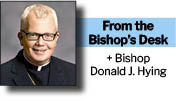
The dictionary definition of “truth” is “actuality” and “a body of real things, events, and facts.”
As Christians, we know that Truth is a person, Jesus Christ, who is the fullness of the reality of God, come to us in human form.
In the Lord, we come to know the truth of God’s divine life, saving activity, and sanctifying presence.
We also come to understand our deepest identity as beloved children of God; our fundamental purpose to know, love, and serve God; and our eternal destiny in the glory of Heaven.
Catholicism is a bold assertion of foundational truths. God exists and created everything that exists.
Jesus Christ is the Son of God, fully human and fully divine.
Through His death on the Cross and Resurrection, we are saved and forgiven.
Jesus founded the Church as His Mystical Body and Bride.
The Eucharist is the Real Presence of Christ in His Body and Blood, Soul and Divinity.
Each of us has a soul and we are going to live forever, with God or without Him, depending on how what we respond to the Lord here on Earth.
These doctrines form the heart and mind, indeed, the worldview of a Catholic disciple who is striving to know the will of God and to embrace the Gospel.
Finding truth in our society
We live in a cultural milieu which has been profoundly misshaped for generations now by the corrosive influence of relativism, secularity, and materialism.
Relativism rejects any assertion of absolute and enduring truth, any proposal of objective morality, or now even any claim of a fixed and given human nature.
As a society, we have no common language or given understanding of reality to even have a conversation about moral questions or the truth of things.
Relativism rejects natural law, inscribed on the human heart, as simply an artificial, religious construct.
As Pilate famously said, as Truth Himself stood before Him, “Truth! What is that?”
Secularity boldly draws an impermeable line between the secular and the sacred, God and the world, the Church and the state, and religion as a private preference and a public influence.
Secularists will often speak about the freedom of worship, but never fully articulate the true meaning of religious freedom.
In other words, they assert, “We don’t care what strange rituals you perform in your buildings on Sunday morning, but don’t bring your faith and values into the public square.”
In recent years, the federal government has consistently sought to force religious institutions and persons to violate their beliefs and consciences in matters pertaining to contraception, abortion, transgenderism, and sexual orientation.
Materialism embraces science as the ultimate explanation of reality.
Any assertion of spirituality, transcendence, divinity, or mystery finds no place in such a world view.
In this ideology, the human person becomes simply a highly-evolved animal who is the sum of his appetites and who formulates a meaning structure for himself.
Science can explain what exists, but it can never get at why anything exists, or speak to the mysteries of life and death, love, and suffering, or hope and grief.
Science without religious faith drains all the romance, wonder, and passion out of life.
We currently live in a profound crisis of truth.
Who believes what the media reports or what politicians promise?
Artificial intelligence had made us suspicious of anything we see. Even language is manipulated to distort the truth of things. Abortion becomes “reproductive freedom”. The surgical damaging of minors is “gender-affirming therapy.” Euthanasia morphs into “death with dignity.”
In this context, I think of Judas using a kiss as his signal to identify and betray the Lord in the Garden of Gethsemane.
He subverts the meaning of a kiss, taking a gesture which signals love and friendship, and turns it into its opposite.
Truth names things as they are and seeks to lead people to know the deep-down reality of God, the world and our own human nature.
The truth always prevails
St. Maximilian Kolbe was arrested by the Nazis in 1941 for publishing an essay on truth in his newspaper.
These men of power with government and arms behind them felt threatened by a lowly Catholic priest who simply spoke about truth in a religious publication.
In order to succeed, ideological systems need to suppress truth, so they seek to limit free speech, control the media, rewrite history, change school curricula, and diminish the influence of religion.
In our current crisis of truth, we need to do what the Church has always done — speak the truth in love and with courage, call people to a relationship with the Lord, proclaim the saving power of the Gospel, and stand on the veracity of our teachings.
During World War II, the Nazis outlawed all cultural and literary expressions of Polish culture, shutting down the universities, banning all book publishing, and the performance of plays which would inspire or speak to the people in their suffering.
Karol Wojtyla, the future St. John Paul II, founded the Rhapsodic Theater, a group of young people who would secretly gather to perform Polish dramas, just to keep their culture alive.
They viewed it as a form of resistance to the Nazi oppression and a liberation from the darkness around them.
They all would have been arrested if they had been discovered.
There came a moment in a particular performance when Karol was reciting his lines and suddenly the cacophony of a Gestapo vehicle’s haunting siren blasted through the apartment windows in which they were gathered.
He simply continued to proclaim his lines, as if to say, “This noisy and evil ideology will not win out over Truth.”
Despite all of the cultural noise of the moment, we are called to continue to proclaim Jesus Christ to a world in desperate need of what only He can give us.

